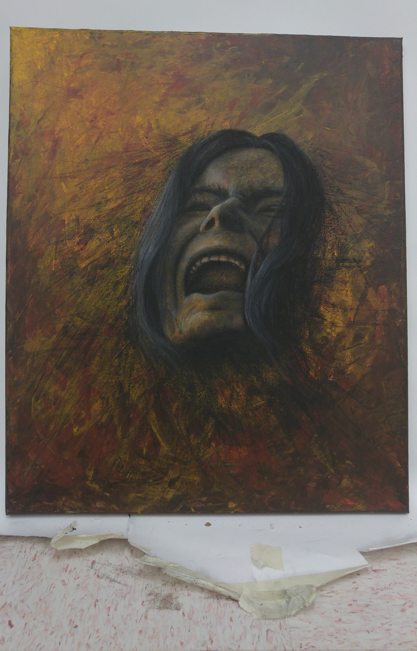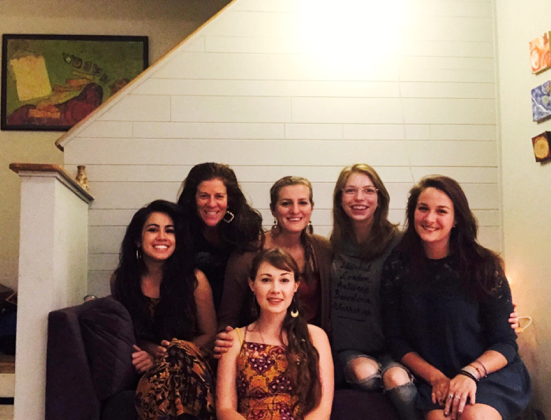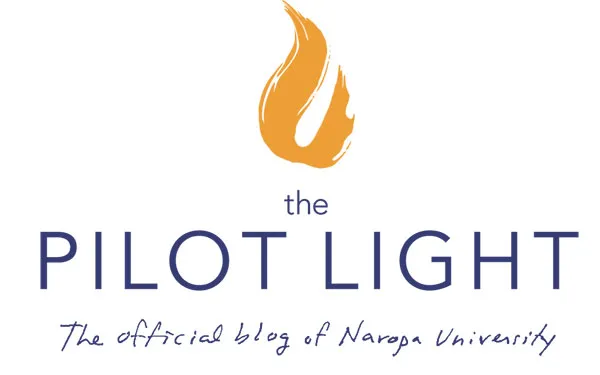
Elise Colley, a second-year student in Naropa’s Graduate School of Counseling Psychology, is pursuing a degree in Clinical Mental Health Counseling with a concentration in Transpersonal Contemplative Art–Based Counseling.
Elise on taking a transpersonal perspective:
“It takes all information into account, even the data that we can’t define, even the things we don’t have words for, even the things that seem to only exist in felt sense, even the things that seem impossible; and that type of approach allows for healing that goes deeper than some approaches have ever dared to brave.”
What year are you, and what does this mean for your areas of focus? (classes/ practicum/ internship/ etc)
I am a second-year art therapy student and that means my classes are more mixed than the previous year. This year, I have a lot more classes with first-year MTC students, which is definitely a different dynamic than that of my classes with my art therapy cohort. But I am also working with a child client on art experientials, as well as applying, interviewing, and shadowing for practicum and internship work.
Can you explain art therapist as a third hand? /what aspects of art therapy most intrigue you?
An Art Therapist can be an artist’s third hand in the art-making making process. Now I say “artist’s” intentionally, rather than client, because that is kind of the point of third hand interventions with clients. Not everyone considers themselves an artist, mostly because our definitions of an artist are usually created around being a profession or of a certain skill level.
With art therapy, we challenge the definition of being an artist, redefining it to be that of anyone who creates art or expresses themselves artistically. Since this is the case, we encourage people to explore new materials and teach them how to use or work with supplies in new ways. An art therapist can be an artist’s third hand in ways of assisting them through the process without doing the art for them. For instance, if they desire a certain color for their piece that they don’t have, an art therapist could show them which colors to mix in order to achieve that color rather than the artist having to sacrifice their authentic artistic desire.
The key here is allowing the artist to achieve the result themselves even if you guide them through it. It would not be considered third hand if the art therapist mixed the paints themselves and then just gave the artist the color. That would be doing it for them; and then you are just another artist, not their third hand. It’s also crucial not to confuse third hand interventions with a type of superiority rescuing. If the artist does not desire your assistance or prefers to use certain materials in a way that they are not designed to be used, a third hand does not tell them simply not to do it that way. A third hand would explain what might happen if they do so and describe to them possible alternatives rather than rules.

What does transpersonal mean to you?
Transpersonal is about going beyond the self. There are a lot of ways one can explain transpersonal, but personally, it means acknowledging all that exists. Transpersonal includes the spiritual; transpersonal is numinous. What I believe is also important in explaining a transpersonal approach is the concept of noumenon, which in metaphysics is a posited object or event that exists independently of human sense and/or perception. That is not to say that all that is transpersonal is a noumenon, but rather holding a perspective that goes so far beyond the self that it can include parts of existence that one has no way of experiencing or perceiving, yet still acknowledging its existence as valid.
What makes this approach different than other therapies?
It’s all-encompassing, rather than black and white narrow-mindedness. It takes all information into account, even the data that we can’t define, even the things we don’t have words for, even the things that seem to only exist in felt sense, even the things that seem impossible, and that type of approach allows for healing that goes deeper than some approaches have ever dared to brave.
Can you talk about what NCAS is and your experience?
My Naropa Community Art Studio experience was nothing short of amazing. NCAS is an organized open art studio model designed to create a space where Naropa’s graduate art therapy students and various populations of artists come together with a supervising mentor in order to work together in learning what an open art studio model can provide, and the opportunities for growth that it can manifest for everyone involved in it.

My specific experience was with the Thursday group which consisted of five student mentors, our supervisor Merryl, and the most inspiring artists that overcome their various mental health challenges with incredible resilience and creativity. Throughout my time in this studio work, I created some of my own art, but also assisted others within our community with theirs.
We shared in each other’s ideas and techniques, and I learned an immense amount in that year. We even held an art show together at the end called Olives and Mollusks, which was an incredible display of just some of the pieces that were made in that fountain of artistic expression we call NCAS. Communities like NCAS are more than just a place to do art, it’s a place to expand your artistic identity, a place to thrive, a place to remind the soul of what community can feel like and the impact having support can make on getting through life’s adversities no matter who you are.
Although I would have to say, I’m not sure that community could have been the experience that it was without our mentor supervisor Merryl. The community may have flourished like a full tree reaching out its branches in every direction constantly developing and growing, but the roots of that tree were Merryl. She is an incredible human with the strength to find the nutrients in even the worst of soil and not only share it with all of us, but teach us how to find those nutrients ourselves.




